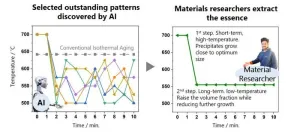(Press-News.org) What if a single one-dollar dose could cure cancer?
A multi-university team of researchers, supported by federal funding, is developing a highly efficient bacterial therapeutic to target cancer more precisely to make treatment safer through a single $1 dose.
Traditionally, cancer therapies have been limited in their efficacy in treating patients. Some, like radiation and chemotherapy, cause harmful side effects, while others tend to result in low patient responsiveness, not to mention the cost it takes to receive treatment. Findings from the American Cancer Society Cancer Action Network recorded that 73% of cancer survivors and patients were worried about how they were going to pay the cost of their cancer care, and 51% said they were in medical debt from treatment. For example, state-of-the-art cancer therapy can cost up to $1,000,000.
Texas A&M University and the University of Missouri are leading the effort to develop a low-cost, safe, and controlled cancer treatment. Researchers received a $20 million grant from the Advanced Research Projects Agency for Health (ARPA-H) to fight cancer. The four-year project is part of the current administration’s Cancer Moonshot initiative, an effort to advance and increase funding for cancer research. It is one of the first projects funded by the newly established agency that aims to accelerate better health outcomes for everyone by supporting the development of high-impact solutions to society’s most challenging health problems.
Rapidly Analyzing Cells
$12 million of the grant will go to the Texas A&M Engineering Experiment Station/Texas A&M, where co-principal investigators Drs. Arum Han, Jim Song and Chelsea Hu are developing synthetic programmable bacteria for immune-directed killing in tumor environments (SPIKEs). The idea is to engineer bacteria to help T cells kill cancerous tissue, destroy itself once the cancer is gone, and leave the body safely as human waste.
“SPIKEs can specifically target tumor cells,” said Han, the Texas Instruments Professor in the Department of Electrical and Computer Engineering. “And since it’s only targeting cancerous tissue and not the surrounding healthy cells, the safety of the patient is exponentially increased. It’s a great honor to be on this team, tackling a major health problem that affects a lot of people.”
Han’s lab is developing high-throughput microfluidic systems that can rapidly process and screen massive bacterial therapeutic libraries, one cell at a time, to quickly identify the most promising treatments. These systems are enabled by integrating microfabrication methods and biotechnology to achieve a pico-liter-volume liquid handling system that can accurately analyze single cells with high precision and high speeds, creating devices to analyze individual cells quickly.
“The major challenge is figuring out how to actually develop these sophisticated microdevices that allow us to conduct millions and millions of fully automated tests with almost no manual or human intervention,” Han said. “That’s the engineering challenge.”
Rescuing Anti-Tumor Immune Cells
While Han innovates and designs microdevices, Song — an immunologist with a background in microbial pathogenesis, T cell biology and T cell-based immunotherapy — has been working on bacteria immunotherapy for the past five years. A certain bacteria known as Brucella Melitensis can manipulate the microenvironment of the human body and promote T cell-mediated anti-tumor immunity to treat at least four types of cancers.
“We are working to improve Brucella Melitensis to more efficiently prevent or suppress tumor growth,” said Song, a professor at the Texas A&M School of Medicine. “Our current approach involves finding out how to engineer bacteria to rescue anti-tumor immune cells, enhancing their effectiveness in killing tumor cells.
“Data so far shows that Brucella’s efficiency is dramatically higher than other cancer treatments, such as Chimeric antigen receptor T cell therapy and T-cell receptor therapies, with a more than 70% responsiveness rate,” Song said.
Safe And Controllable Therapeutics
While Song continues to test the bacteria’s efficiency using cancer models, Hu, an assistant professor in the Artie McFerrin Department of Chemical Engineering and a synthetic biologist, is working to ensure the living bacterial therapeutic is safe and controllable.
“The Brucella strain we’re using has been shown to be safe for the hosts because it is an attenuated version, meaning a key gene that is required for bacteria virulence has been deleted,” Hu said. “Ultimately, we want to control the bacterium’s rate of growth, where it grows within the tumor environment, and its ability to self-destruct when its mission is completed.”
To control the growth rate, the bacterium’s genes will be altered to regulate its population and oscillate around a specific setpoint. Hu also plans to engineer biosensors into the bacteria, enabling them to differentiate between healthy tissue and tumor tissues to ensure they grow only within the tumor microenvironment.
The bacterium will be engineered to have a receptor to ensure that once the cancer is gone, the patient can take antibiotics that will signal the bacterium to essentially cut itself into pieces and be removed safely from the patient’s body.
“As humans, we’re actually covered in bacteria, and a lot of diseases are caused by an imbalance in these bacterial communities,” Hu said. “For instance, while some people have incredibly fragile stomachs, others have robust ones. The science behind it is that those people with strong immune and digestive systems have a healthy community of bacterial cells in their gut. There’s a lot of potential in living therapeutics.”
“It’s a really great opportunity to have an incredible team who have expertise and can push this technology to the front line,” Hu said. “So that sort of goal is to reach the clinic and provide patients with an effective cancer treatment at less than $1 per dose.”
Attacking Difficult Issues Using Unconventional Approaches
Other collaborators include Dr. Zhilei Chen at the Texas A&M Health Science Center and Dr. Xiaoning Qian in the Department of Electrical and Computer Engineering, along with the principal investigator, Dr. Paul de Figueiredo, from Missouri University.
“The three key advantages to this work are high safety, low cost and specific targeting of cancerous tumors,” Han said. “We are very excited that we are one of the first teams that are getting support from ARPA-H, which is a brand-new agency established and supported by Congress to really tackle hard problems in broad areas of health. We’re attacking difficult issues using unconventional approaches. High risk, high impact is the hallmark of our approach.”
And the future applications of engineering bacteria that this research unlocks are limitless.
“For our next big project, we will work together to engineer bacteria against autoimmune diseases such as type 1 diabetes and rheumatoid arthritis,” Song said. Bacterium-based immunotherapy represents a groundbreaking frontier in medicine, offering the potential to revolutionize the treatment of autoimmune diseases. With the power of beneficial microbes harnessed to modulate the immune system, we are on the verge of changing the future of medicine. Our research and expertise hold the promise of transforming the lives of millions of people, providing them with new hope and healthier tomorrows.”
By Katie Satterlee, Texas A&M Engineering
###
END
Revolutionizing cancer treatment through programmable bacteria
Texas A&M University researchers are co-leading a $20 million project to develop a $1 cancer treatment
2023-11-27
ELSE PRESS RELEASES FROM THIS DATE:
One protein is key to the spread of lung cancer. Now, a new study has found a way to stop it
2023-11-27
A new study by Tulane University has uncovered a previously unknown molecular pathway that could be instrumental to halting lung cancer in its tracks.
Lung cancer is one of the most common cancers and the leading cause of cancer-related deaths in the world. The research, published in the journal Proceedings of the National Academy of Sciences, could lead to the development of a new anti-cancer drug and more personalized lung cancer treatment, said senior study author Dr. Hua Lu, the Reynolds and Ryan Families Chair in Translational Cancer at the Tulane University School of Medicine.
The study found ...
Study: Spike in premature births caused by COVID, halted by vaccines
2023-11-27
MADISON, Wis. — COVID-19 caused an alarming surge in premature births, but vaccines were key to returning the early birth rate to pre-pandemic levels, according to a new analysis of California birth records.
“The effect of maternal COVID infection from the onset of the pandemic into 2023 is large, increasing the risk of preterm births over that time by 1.2 percentage points,” says Jenna Nobles, a University of Wisconsin–Madison sociology professor. “To move the needle on preterm birth that much is akin to a disastrous ...
Why does puberty trigger us to stop growing?
2023-11-27
All animals start out as a single-celled organism and then start growing. At some point, of course, they need to stop getting bigger, but the process by which this happens is poorly understood.
New research from Alexander Shingleton at the University of Illinois Chicago and colleagues identifies a potential trigger that makes fruit flies stop growing, which has implications for understanding human development. The research is published in the Proceedings of the National Academy of Sciences.
In humans, the body’s signal to stop growing happens around puberty, though it takes several more years before growth actually ceases. It is important to better ...
Maternal vaccination against COVID-19 lowered risk of preterm births, Stanford study finds
2023-11-27
During the first two years of the pandemic, a COVID-19 infection during pregnancy increased the risk of preterm birth and NICU hospitalizations. However, by 2022, when COVID-19 vaccines were readily available in the United States, this effect disappeared – suggesting that vaccination against the coronavirus may have prevented thousands of preterm births, according to a new study led by Stanford sociologist Florencia Torche.
The study’s findings, published Nov. 27 in the journal Proceedings of the National ...
UCF receives $1.5million NSF grant to improve energy efficiency of wireless communications
2023-11-27
Wireless devices consume more than just the hours users spend scrolling through social media, streaming podcasts and TV shows, and playing games. The networks used to connect these devices also consume a large amount of energy – up to a few thousand terawatt-hours annually worldwide, which is enough to power 70,000,000 homes for one year.
UCF researcher Kenle Chen aims to enhance the energy efficiency of these systems with the support of a $1.5 million grant from the National Science Foundation’s Addressing Systems Challenges through Engineering ...
No IKAROS, no antibodies
2023-11-27
A cell nucleus is a busy place. Cellular proteins twist and pull DNA, folding the genome into intricate 3D structures that support functioning of its coding parts.
This choreography is essential for cell development, and the exact steps vary wildly between cell types. Establishing proper communication between genes and far-away control switches at the right time in the right cell is not a small feat. In fact, very few proteins have the right combination of features to organize the genome into the right structures.
In ...
New framework for using AI in health care considers medical knowledge, practices, procedures, values
2023-11-27
Health care organizations are looking to artificial intelligence (AI) tools to improve patient care, but their translation into clinical settings has been inconsistent, in part because evaluating AI in health care remains challenging. In a new article, researchers propose a framework for using AI that includes practical guidance for applying values and that incorporates not just the tool’s properties but the systems surrounding its use.
The article was written by researchers at Carnegie Mellon University, The Hospital for Sick Children, the Dalla Lana School of Public Health, Columbia University, and the University of Toronto. It is published in Patterns.
“Regulatory ...
Increasing high-temperature strength of materials through collaborative efforts of AI and materials researchers
2023-11-27
1. A materials research team consisting of NIMS and Nagoya University has designed a novel two-step thermal aging schedule (i.e., non-isothermal aging or unconventional heat treatment) capable of fabricating nickel-aluminum (Ni-Al) alloys that are stronger at high temperatures than Ni-Al alloys fabricated using conventional thermal aging processes. This was achieved by using artificial intelligence (AI) techniques to identify several dozen different thermal aging schedules potentially effective in increasing alloys’ high-temperature strength. The mechanisms ...
The jigglings and wigglings of atoms reveal key aspects of COVID-19 virulence evolution
2023-11-27
Auburn, AL – Richard Feynman famously stated, “Everything that living things do can be understood in terms of the jigglings and wigglings of atoms.” This week, Nature Nanotechnology features a groundbreaking study that sheds new light on the evolution of the coronavirus and its variants of concern by analyzing the behavior of atoms in the proteins at the interface between the virus and humans. The paper, titled “Single-molecule force stability of the SARS-CoV-2–ACE2 interface in variants-of-concern,” is the result of an international collaborative ...
UCF receives 3 minority serving institution awards to promote collaborations with NASA
2023-11-27
ORLANDO, Nov. 27, 2023 – Three research projects from the University of Central Florida have been selected for NASA Minority University Research and Education Project Partnership Annual Notification (MPLAN) awards. The grants, worth up to $50,000 each, are designed to connect and promote research collaborations between Minority Serving Institutions and NASA Mission Directorates.
A total of 18 projects received Phase I funding across 15 universities. UCF received the most awards, with all three housed within the College of Engineering and Computer Science. Dean Michael Georgiopoulos ...
LAST 30 PRESS RELEASES:
Scientists discover why we know when to stop scratching an itch
A hidden reason inner ear cells die – and what it means for preventing hearing loss
Researchers discover how tuberculosis bacteria use a “stealth” mechanism to evade the immune system
New microscopy technique lets scientists see cells in unprecedented detail and color
Sometimes less is more: Scientists rethink how to pack medicine into tiny delivery capsules
Scientists build low-cost microscope to study living cells in zero gravity
The Biophysical Journal names Denis V. Titov the 2025 Paper of the Year-Early Career Investigator awardee
Scientists show how your body senses cold—and why menthol feels cool
Scientists deliver new molecule for getting DNA into cells
Study reveals insights about brain regions linked to OCD, informing potential treatments
Does ocean saltiness influence El Niño?
2026 Young Investigators: ONR celebrates new talent tackling warfighter challenges
Genetics help explain who gets the ‘telltale tingle’ from music, art and literature
Many Americans misunderstand medical aid in dying laws
Researchers publish landmark infectious disease study in ‘Science’
New NSF award supports innovative role-playing game approach to strengthening research security in academia
Kumar named to ACMA Emerging Leaders Program for 2026
AI language models could transform aquatic environmental risk assessment
New isotope tools reveal hidden pathways reshaping the global nitrogen cycle
Study reveals how antibiotic structure controls removal from water using biochar
Why chronic pain lasts longer in women: Immune cells offer clues
Toxic exposure creates epigenetic disease risk over 20 generations
More time spent on social media linked to steroid use intentions among boys and men
New study suggests a “kick it while it’s down” approach to cancer treatment could improve cure rates
Milken Institute, Ann Theodore Foundation launch new grant to support clinical trial for potential sarcoidosis treatment
New strategies boost effectiveness of CAR-NK therapy against cancer
Study: Adolescent cannabis use linked to doubling risk of psychotic and bipolar disorders
Invisible harms: drug-related deaths spike after hurricanes and tropical storms
Adolescent cannabis use and risk of psychotic, bipolar, depressive, and anxiety disorders
Anxiety, depression, and care barriers in adults with intellectual and developmental disabilities
[Press-News.org] Revolutionizing cancer treatment through programmable bacteriaTexas A&M University researchers are co-leading a $20 million project to develop a $1 cancer treatment



